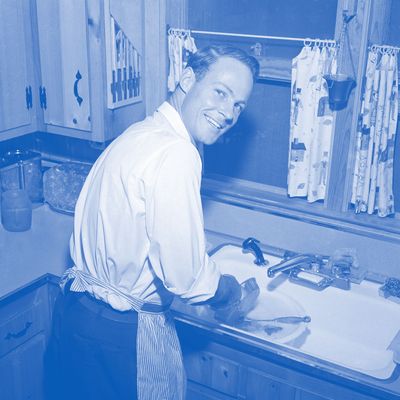
It’s kind of impressive how, when an onerous task is looming, your mind’s capacity for creative excuses seemingly knows no bounds. You’ll get around to scrubbing the bathroom when you’re not as tired. When it’s not so hot in your apartment. When this Millionaire Matchmaker marathon ends. When it’s a full moon and Mercury is in retrograde. Really, the only limit is your own imagination.
Eventually, though, the bathroom starts creeping closer to a state of unbearable filth, and you know that at some point, you’re going to have to just suck it up and clean this thing. And researchers can probably predict when that moment will come: A study recently published in the Proceedings of the National Academy of Sciences and highlighted by Ars Technica found that your mood may be the best predictor of when you’ll actually get around to doing all the unpleasant things you have to do — specifically, the happier you feel, the more likely you are to tackle the dullest or most annoying chores.
The study authors surveyed around 28,000 people about their emotional states and how they spent their time, using a phone app to collect data continuously over a seven-day period, and then studied the relationship between the two components. As Ars Technica reported:
Some activities, such as sleeping and going to a job, were most tightly linked with time and day rather than mood. But others were strongly linked to mood. For instance, if you met a total stranger and wanted to “predict how likely that person is to exercise, chat with friends, or have a drink in the next few hours, knowing her current mood would give you more information than knowing that it is Saturday or that it is 7:00 PM,” the researchers found. In fact, the researchers found that starting the day in an unhappy mood would make you twice as likely to do a mood-boosting activity, such as going for a walk or playing a sport, than if you woke up in a cheerful mood.
On one level, the findings are fairly intuitive — no one wakes up crabby and thinks, You know what would really make this morning a party? Busting out the Clorox Wipes. On the other hand, the authors argue, their study adds some nuance to the idea that we’re primed to seek out pleasure first and foremost.
“Most theories of motivation have highlighted that human behavior is guided by the hedonic principle,” they wrote. “However, it is not clear how to reconcile this idea with the fact that people routinely engage in unpleasant yet necessary activities.” But this study, they argue, suggests that “our personal well-being and survival potential as a species might crucially depend on our ability to overcome the allure of short-term happiness gains to maximize long-term welfare.” On the flipside: If you’re in a foul mood, here’s your excuse to put off your to-dos a little while longer.




